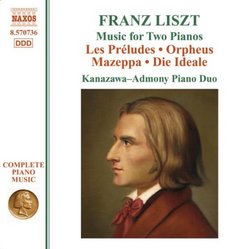| All Artists: Franz Liszt, Kanazawa-Admony Piano Duo Title: Liszt: Music for Two Pianos Members Wishing: 0 Total Copies: 0 Label: Naxos Original Release Date: 1/1/2008 Re-Release Date: 7/29/2008 Genre: Classical Styles: Chamber Music, Historical Periods, Classical (c.1770-1830), Instruments, Keyboard Number of Discs: 1 SwapaCD Credits: 1 UPC: 747313073672 |
Search - Franz Liszt, Kanazawa-Admony Piano Duo :: Liszt: Music for Two Pianos
CD Details |
CD ReviewsLiszt's Two-Piano Arrangements of Four of His Tone Poems J Scott Morrison | Middlebury VT, USA | 08/26/2008 (5 out of 5 stars) "Liszt was, of course, perhaps the premier pianist of his age. He was also one of the most original 19th-century composers for the piano. He was not, at least in the opinion of many (myself included), a great composer for orchestra. That is to say, his orchestrations were not at the same level as his writing for piano. But his tone poems -- a genre he is considered to have invented, one in which he attempts to tell a story in abstract music alone -- contain much fine music. It is no surprise then that not only did he transcribe many of his orchestral tone poems for piano -- in this case for two pianos -- but that some of this music is among his finest. It is pity, really, that these arrangements are not better known. In fact, we rarely hear the orchestral tone poems in concert these days, with the possible exception of Les Préludes which, it must be admitted, was once much more popular that it is these days. And in more than fifty years of concert-going I've never heard any of the arrangements heard on this disc.
Naxos has been recording all of Liszt's piano music -- this CD is Number 29 in the ongoing series -- and I am very happy to have received this issue. The Israeli two-piano team of Tami Kanazawa and Yuval Admony are young prizewinners of whom I'd never heard. Their playing is, however, world-class and they do a terrific job of maintaining musical interest in the four sometimes discursive tone poems contained herein: Les Préludes, Orpheus, Mazeppa, and the rarest of all - Die Ideale. One of the characteristics of all four tone poems is their episodic nature, not surprising when one considers that they are telling stories. Thus it is inherently difficult for the performers to make them into coherent entities. In these recordings, Kanazawa and Admony manage to sidestep these pitfalls while making their way through the various sections of the narrative thread. It must be stated, however, that they are helped considerably by Liszt's wizardry at getting just the right sort of sound for each of these episodes and at tying them together satisfactorily. Listen, for instance, to the eerily hesitant pianissimo first few notes of Les Préludes followed by the main theme. I've never heard an orchestra do it any better. Or hear the radiant lyricism of 'Orpheus', a paean to the power of music. Kanazawa and Admony makes us forget that the piano is essentially a percussion instrument. And somehow they avoid what, in the orchestral version, can come across as blowziness. Les Préludes is essentially a monothematic work that never palls because of Liszt's ability to vary the theme in myriad ways. The pro-Brahms critic Eduard Hanslick, who pooh-poohed the very notion of a piece of abstract music weaving a story, characterized Les Préludes as 'the life and adventures of a theme.' He got it right, even though he meant the phrase as a sneer. Liszt's Mazeppa perhaps bites off a bit more than it can chew. It attempts to tell in musical terms the story of Victor Hugo's protagonist, the Cossack hero Mazeppa, and obviously it is stretched to the limit in depicting Mazeppa tied, naked, to the back of a wild horse by the husband of a woman he had seduced. But indeed that episode is easy to picture (of course, only if one already knows the story) and goes on to depict Mazeppa's development into a fearless leader. The piano writing in Mazeppa is among Liszt's more virtuosic and it is given a marvelous performance here. Die Ideale was inspired by Schiller's poem of that name. It elaborately depicts the noble ideals of youth followed by the disillusion that experience brings. The narrative then proceeds toward the transcendence into consoling faith. It is said that this also depicts Liszt's own life-journey. At almost twenty-five minutes in length, this work is one of Liszt's least-known but most effective. I was left exhausted and exhilarated by this performance, and I have concluded that I prefer these two-piano arrangements to their orchestral originals. Strongly recommended. Scott Morrison" |

